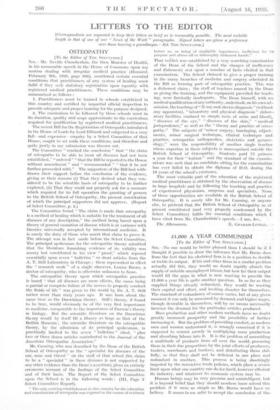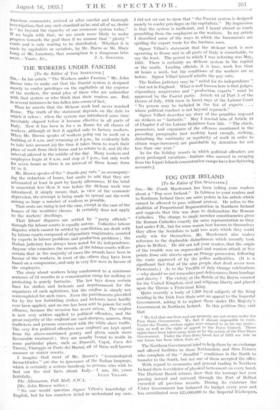£1,000 A YEAR COMMUNISM [To the Editor of TIIE, SPECTATOR.]
I :
Sin,—No one would be better pleased than I should be if, I. thought it possible to draw the inference that Mr. Burns does from the fact that his electrical firm is in a position to double,' or treble,its output. If his and other firms in,a similar positions actually did this, they would no doubt rapidly absorb the . supply of suitable unemployed labour, but how far their output would fill the gaps in what is now wanting to provide the., £1,000 a year life is quite another question. In so far as they supplied things already redundant, they would be wasting their capital and effort, and inviting disaster for themselves: The standard of redundancy of course varies, but at any given moment it can only be measured by demand, and higher wages, though desirable in themselves, will by no means necessarily increase the demand for the particular articles produced.
Mass production and other modern methods have no doubt . greatly increased prosperity and the possibility of further • increasing it. But the problem of providing comfort, as modern men and women understand it, is wrongly conceived if it is supposed to consist merely in multiplying mass production and absorbing labour into it. It is the problem.of assembling a multitude of products from all over the world, procuring them in their due proportions.by the joint' efforts of producers,' traders, merchants and bankers, and distributing, them skils. fully, so that they shall .not • be deficient in one place and redundant in another. This process is being shockingly impeded by the restrictive trade policies, which place a severe limit upon what one country can do for itself, however efficient its industry, and whatever its economic system may be.
Human beings may be very perverse and unintelligent, but it is beyond belief that they should nowhere have solved this problem if it 'were as simple as Mr. Burns. would have us believe. It seems to me safer to accept the .conclusion of the • American economists, arrived at after careful and thorough investigation, that any such standard ashe, and all-of us; deSire is " far beyond the capacity of our economic system today." If we begin with that, 'we are flinch more likely to make Progress towards the goal than if we assume that " plenty "' exists and is only waiting to be distributed. Whether it is made by capitalists or socialists, by .Mr. Burns or Mr. Huey Long or Mr. Lansbury, that assumption is a dangerous false



































 Previous page
Previous page